Unit 1 Festivals around the world
- 格式:docx
- 大小:41.10 KB
- 文档页数:5

Book 3Unit 1Festivals around the worldⅠ.阅读理解话题:节假日活动难度星级:☆There are many unique festivals around the world.Here are some of them.Las Fallas,SpainLas Fallas is one of Spain’s strangest and craziest festivals.The focus of this festival is to create and destroy dolls.These dolls are lifelike and usually make fun of dishonest politicians and famous people in Spain.Many dolls are several feet tall.They remain complete until March 19th,after which men fill them with fireworks.All the streetlights are turned off and the dolls are set on fire on March 19th.Day of the Dead,MexicoDay of the Dead is traditionally celebrated on the 1st and 2nd of November in Mexico.This festival celebrates the lives of loved ones around you who have died.Celebrations can take a humorous tone as celebrants remember funny events about the dead.Toys are brought for the dead children and bottles of wine for adults.Mardi Gras,U.S.A.This day can occur anytime between February 3rd and March 9th,depending on when Easter is held that year.It is also called Fat Tuesday,reflecting the practice of eating richer and fatty foods.Other practices include wearing masks and parades,etc.Night of the Radishes,MexicoIt’s one of the most colorful and unique festivals of Mexico.It is celebrated on December 23rd.As crazy as it sounds,the festival lasts only a few hours due to the limited lifetime of vegetables as folk art.语篇解读本文主要介绍了世界上比较特殊的四个节日:西班牙的法雅节、墨西哥的亡灵节、美国的狂欢节和墨西哥的萝卜节,并对这四个节日的意义以及活动内容作了简要介绍。

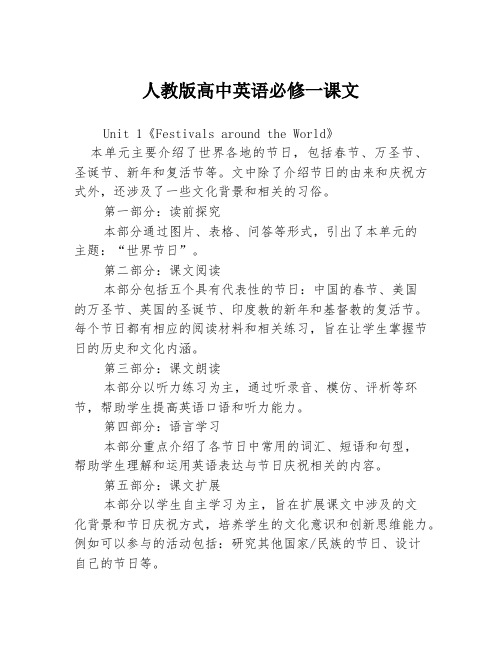
人教版高中英语必修一课文
Unit 1《Festivals around the World》
本单元主要介绍了世界各地的节日,包括春节、万圣节、圣诞节、新年和复活节等。
文中除了介绍节日的由来和庆祝方式外,还涉及了一些文化背景和相关的习俗。
第一部分:读前探究
本部分通过图片、表格、问答等形式,引出了本单元的
主题:“世界节日”。
第二部分:课文阅读
本部分包括五个具有代表性的节日:中国的春节、美国
的万圣节、英国的圣诞节、印度教的新年和基督教的复活节。
每个节日都有相应的阅读材料和相关练习,旨在让学生掌握节日的历史和文化内涵。
第三部分:课文朗读
本部分以听力练习为主,通过听录音、模仿、评析等环节,帮助学生提高英语口语和听力能力。
第四部分:语言学习
本部分重点介绍了各节日中常用的词汇、短语和句型,
帮助学生理解和运用英语表达与节日庆祝相关的内容。
第五部分:课文扩展
本部分以学生自主学习为主,旨在扩展课文中涉及的文
化背景和节日庆祝方式,培养学生的文化意识和创新思维能力。
例如可以参与的活动包括:研究其他国家/民族的节日、设计
自己的节日等。
第六部分:写作训练
本部分通过例句分析和提供写作范文等方式,引导学生掌握如何用英语表达关于节日庆祝的内容,提高写作能力。
第七部分:文化背景
本部分重点介绍了各节日的文化背景和相关的习俗、传统,帮助学生加深对节日的认识和理解。
第八部分:单元测试
本部分为本单元的测试部分,主要包括听力测试、阅读理解和写作。
旨在检验学生对所学知识点的掌握情况,并为学生未来的学习提供参考。
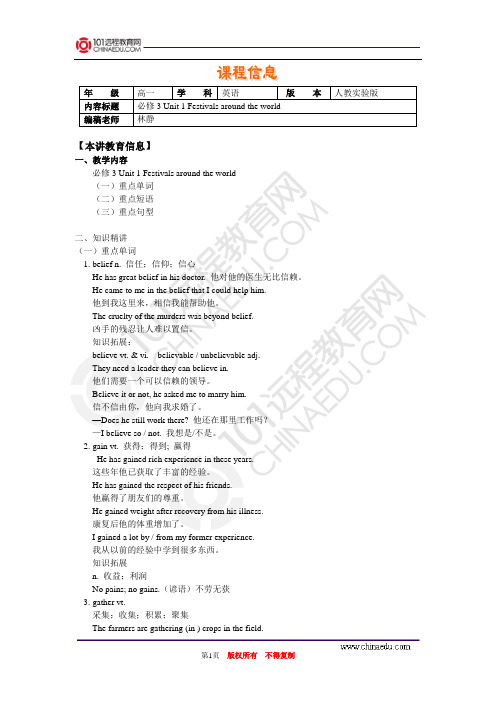
【本讲教育信息】一、教学内容必修3 Unit 1 Festivals around the world(一)重点单词(二)重点短语(三)重点句型二、知识精讲(一)重点单词1. belief n. 信任;信仰;信心He has great belief in his doctor. 他对他的医生无比信赖。
He came to me in the belief that I could help him.他到我这里来,相信我能帮助他。
The cruelty of the murders was beyond belief.凶手的残忍让人难以置信。
知识拓展:believe vt. & vi. believable / unbelievable adj.They need a leader they can believe in.他们需要一个可以信赖的领导。
Believe it or not, he asked me to marry him.信不信由你,他向我求婚了。
—Does he still work there? 他还在那里工作吗?—I believe so / not. 我想是/不是。
2. gain vt. 获得;得到; 赢得He has gained rich experience in these years.这些年他已获取了丰富的经验。
He has gained the respect of his friends.他赢得了朋友们的尊重。
He gained weight after recovery from his illness.康复后他的体重增加了。
I gained a lot by / from my former experience.我从以前的经验中学到很多东西。
知识拓展n. 收益;利润No pains; no gains.(谚语)不劳无获3. gather vt.采集;收集;积累;聚集The farmers are gathering (in ) crops in the field.农民们正在田野里收割庄稼。
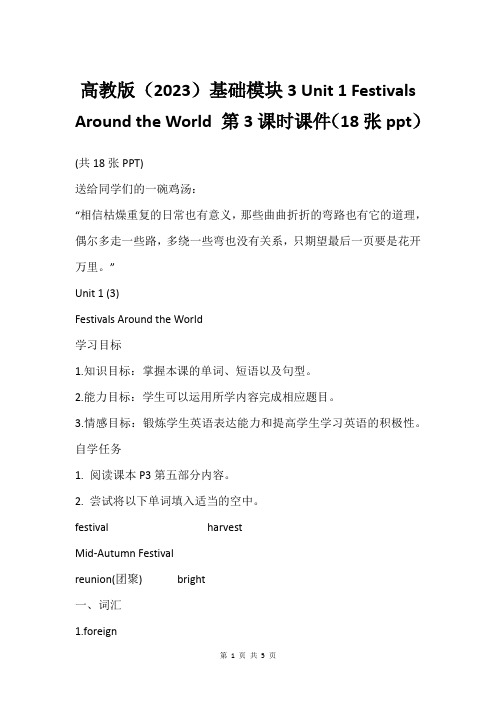
高教版(2023)基础模块3 Unit 1 Festivals Around the World 第3课时课件(18张ppt)(共18张PPT)送给同学们的一碗鸡汤:“相信枯燥重复的日常也有意义,那些曲曲折折的弯路也有它的道理,偶尔多走一些路,多绕一些弯也没有关系,只期望最后一页要是花开万里。
”Unit 1 (3)Festivals Around the World学习目标1.知识目标:掌握本课的单词、短语以及句型。
2.能力目标:学生可以运用所学内容完成相应题目。
3.情感目标:锻炼学生英语表达能力和提高学生学习英语的积极性。
自学任务1. 阅读课本P3第五部分内容。
2. 尝试将以下单词填入适当的空中。
festival harvestMid-Autumn Festivalreunion(团聚) bright一、词汇1.foreignadj.外国的,外来的foreigner【C】n. 外国人,外来人练习造句:他是一名外国学生。
2. vocation n.职业,工作vocational adj. 职业的,职业技术的vocational school:职业学校例:我在一所职业学校上学。
vacation n.假期v.度假summer vacation 暑假winter vacation 寒假go on vacation: 去度假例:我计划暑假去海南度假。
句子练习:1.她是一名职业学校的学生。
2.他的职业是一名警察。
He chose teaching as his _________ vocational B. vocationC. vacationD. vacational3. celebrate v. 庆祝,赞美celebration n. 庆祝,颂扬We had a________ in the hall yesterday.celebrated B. celebrateC. celebratesD. celebration4.familyfamily :“家人” ,不可数名词。

Book 3 Unit 1 Festivals around the worldⅠ.单项填空1.As the storm drew nearer, black clouds were________over the sky.A.smoothing B.disappearingC.gathering D.picking答案C[考查动词词义的辨析。
smooth使平整;使光滑;disappear消失;gather聚集;pick选择;挑选。
由语境可知C项正确。
句意:随着暴风雨的来临,乌云在天空聚集起来。
]2. We have bought so much food now that Suzie won’t be with us for dinner.A.may not B.needn’t C.can’t D.mustn’t答案B [may not不可以,needn’t不需要,can't不可能,mustn't绝不可能。
本句句意为:既然Suzie不和我们一起吃晚饭,所以我们就不需要买这么多食物。
] 3.Kathy________some French while she was away on a business trip in France.A.picked up B.took upC.made up D.turned up答案A[考查动词短语的辨析。
pick up拾起;捡起;无意中学会;take up开始从事;make up 弥补;编造;turn up 出现;调大音量。
句意:Kathy在去法国出差时学会了一些法语。
]4.It is________that he has been addicted to the drugs and has difficulty quitting it.A.obviously B.apparentlyC.possibly D.likely答案D[考查句型的搭配。

Unit 1 Festivals around the world备课编写人:王新祯高雁虹【目标体验】【重点突破】1.Discuss when they take place, what they celebrate andwhat people do at that time.讨论这些节日是什么时间举行、庆祝的是什么事、人们在那天做什么。
take place发生;举行①When does the ceremony take place?仪式什么时候举行?②We have never discovered what took place between them that night.我们从未发觉那天晚上他们之间发生了什么事情。
在过去的20年里,中国发生了巨大的变化。
②Accidents like this happen all the time.此类事故经常发生。
③Death occurred about midnight, the doctor says.医生说大约是半夜死的。
①Let’s take the radio apart and see what’s wrong with it.我们把收音机拆开看看有什么毛病。
②These books must not be taken away from the library.这些书不准带出图书馆。
③I take back what I said about you being selfish.我承认我不该说你自私。
④The army is threatening to take over if civil unrest continues. 军方声称如内乱不平息将实行军官。
[即景活用]They decided that the meeting should_______ on Monday.A. holdB. happenC. be taken placeD. take place [自我校对]D2. At that time people would starve if food was difficult to find, especially during the cold winter months.在那个时代,如果食物难以找到,特别是在寒冷的冬月,人们就会挨饿。




Unit 1 Festivals around the worldWarming up, Pre-reading ,Reading重点词语及短语解析1.mean的用法(1) mean doing sth. “意味着(必须要做某事或导致某中结果)”,其主语通常是指事物的词。
Being a student means studying hard.作为一个学生,(意味着)你要努力学习。
(2) mean to do sth. “打算或企图做某事”,其主语通常是表示人的名词或代词。
What do you mean to do with it?你打算把它怎样处理?(3) mean sb. to do sth. “打算让某人做某事”,也可以用于被动结构。
I mean you to work as our spokesman.我想请你当我们的代言人。
(4) mean 后接名词,副词,意为“表示,打算,存心”等意思,后接that从句,意为“表示……”。
He meant no harm.他没有害人的意思。
The sign means that the road is blocked.这个标志表示此路不同。
(5) What do/ did you mean by…? 你……是什么意思?What do you mean by education?你说“education”是什么意思?(6) be meant for 打算给予,打算做……用The magazine was meant for young girls.那份杂志是编给年轻女孩看的。
2. celebrate可作及物和不及物动词,意为“庆祝”。
It’s Dad’s birthday and we’re go ing out for a meal to celebrate.这天是爸爸的生日,我们将外出以示庆祝。
词语辨析:celebrate / congratulatecelebrate 与congratulate都与喜事有关,但是后面所接的宾语不一样。

【语法讲解】Unit 1 Festivals around the world 精讲语法情态动词(I)一、概述情态动词表示说话人的某种感情或语气,对某一动作或状态的某种态度,表示“需要”“可以”“必须”“应当”等意义。
情态动词有以下特征:1. 不能单独作谓语,除ought to和used to以外,后面只能接不带to的不定式。
2. 没有人称和数的变化。
但有些情态动词,如can, will, dare有一般时和过去时的变化。
3. 情态动词的“时态”的形式并不是区分时间的主要标志。
不少情况下,情态动词的现在时形式和过去时形式都可用来表示现在时间、过去时间或将来时间。
二、用法归纳1. can和could(1)表示能力,常译为“能,会”。
e.g. I can speak Japanese, but I can't write it. 我会说日语,但是不会写。
(2)表示允许,常译为“可以”;could还可以表示更加委婉地请求或许可。
e.g. —Can/Could I have a look at your photos? 我可以看看你的照片吗?—Of course you can.当然可以了。
You can smoke in this room. 你可以在这间屋子里吸烟。
(3)表示对现在或过去情况的推测,只用于疑问句或否定句中。
e.g. —Can she be in the classroom? 她可能在教室吗?—No, she can't be in it. 不,她不可能在教室里。
Can what he said be true? 他说的可能是真的吗?(4)用于肯定的陈述句中,表示理论上或习惯上的可能性。
e.g. Accidents can happen at any time.事故随时会发生。
It could be very interesting to go out for a drive.出去开车兜风可能会很有趣。

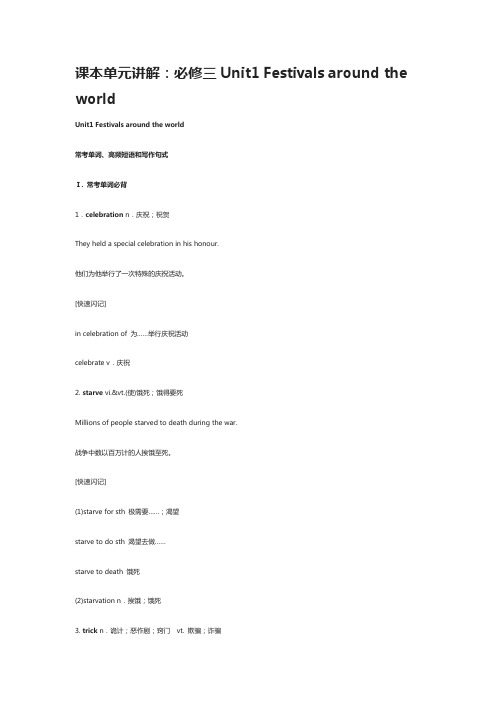
课本单元讲解:必修三Unit1 Festivals around the worldUnit1 Festivals around the world常考单词、高频短语和写作句式Ⅰ. 常考单词必背1.celebration n.庆祝;祝贺They held a special celebration in his honour.他们为他举行了一次特殊的庆祝活动。
[快速闪记]in celebration of 为……举行庆祝活动celebrate v.庆祝2. starve vi.&vt.(使)饿死;饿得要死Millions of people starved to death during the war.战争中数以百万计的人挨饿至死。
[快速闪记](1)starve for sth 极需要……;渴望starve to do sth 渴望去做……starve to death 饿死(2)starvation n.挨饿;饿死3. trick n.诡计;恶作剧;窍门vt. 欺骗;诈骗A clever lawyer should be able to trick the prisoner into an admission of guilt.聪明的律师应能诱使罪犯认罪。
[快速闪记]trick sb into (doing) sth 诱使某人做某事trick sb out of sth 从某人处骗取……4. award n.奖;奖品vt. 授予;判定He won the first awards of many English contests.他获得过许多英语比赛的一等奖。
The school awarded Mary a prize for her good work.学校因为玛丽的出色表现而奖励了她。
5. admire vt. 赞美;钦佩;羡慕I admire him for his success in business.我钦佩他事业有成。
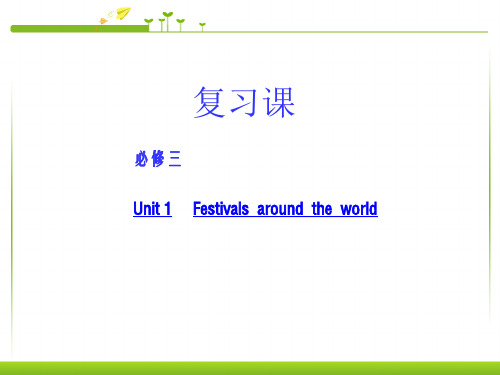


Unit 1 Festivals around the world
Module 3
◆Lesson type: lesson
◆Duration: 45 min
◆Students: senior
CONTENT
I.Teaching Material & Learning Condition (1)
1.The analysis of teaching material (1)
2.The analysis of learning condition (2)
nguage Focuses & Anticipated Difficulties (2)
1.The analysis of the language focuses (2)
2.The analysis of the anticipated difficulties (2)
III.Teaching Aims (2)
1.Knowledge objectives (2)
2.Ability objectives (2)
3.Morality objectives (2)
IV.Teaching Methods (3)
V.Teaching Aids (3)
VI.Teaching Procedure (3)
VII.Blackboard Writing (5)
VIII.Reflection of This Lesson Plan (5)
I.Teaching Material & Learning Condition
1.The analysis of teaching material
This unit talks about festivals of many kinds in different parts of the world. The first reading briefly describes four different kinds of festivals. Two others, Qiqiao Festival and Carnival, are introduced in the rest of the unit. By studying this unit, students can not only improve their English learning ability but also know more about the festivals at home and abroad. At the same time, I should use this opportunity to let students think about the reasons for festivals and the reasons for different ways of celebrations.
2.The analysis of learning condition
Students have been learning English in senior middle school for over a year. They have a basic understanding of the working of English class in senior middle school. Most of them have the ability to express themselves clearly in English, some even can manage to do it fluently. They have mastered a majority of daily communicative language and a general picture of grammar.
Additionally, this unit is the beginning of a semester. After a long holiday, they tend to be unwilling or shy to open their mouth to speak English. Anyway, they didn’t speak English or do it as frequently as they did when they were during school days.
nguage Focuses & Anticipated Difficulties
1.The analysis of the language focuses
1)Some useful words and phrases such as “take place”, “in memory of”, “dress up”, “play a
trick”, “look forward to”, “day and night” and so on.
2)The usage of Modal Verb is an important point of this unit.
2.The analysis of the anticipated difficulties
1)It may be difficult for students to understand the whole passage with so many new words
and phrases.
2)Rushing into a situational communication may cause confusion and dissatisfaction.
3)Reading skills such as skimming, scanning and summarizing are difficult for students.
III.Teaching Aims
The fundamental aim of the new English curriculum is to develop students’ comprehensive language competence. According to the new English curriculum, this lesson plan has three aims.
1.Knowledge objectives
1)Enable students to name some festivals at home and abroad.
2)Guide students to talk about a certain festival.
3)Enable students to use Modal Verb.
4)Guide students to write a similar composition of a different festival.
2.Ability objectives
1)To develop the students’ abilities of listening, speaking, reading and writing
2)To guide students to set up effective studying strategies
3)To improve the students’ reading ability, especially their skimming and scanning ability
4)To train the students’ abilities to study by themselves and cooperate
3.Emotion objectives
1)Enable the students to talk about festivals, learn more about them and make them a part of。